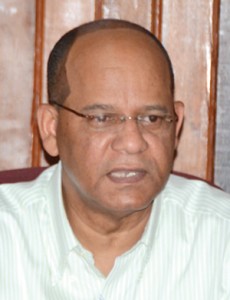
Amid calls for some limited legalisation of marijuana in Guyana, Home Affairs Minister Clement Rohee on Tuesday reaffirmed the government of Guyana’s zero-tolerance policy on all drugs that are deemed illicit, including marijuana.
There has been a global debate regarding the legalisation of marijuana, with even United States President Barack Obama saying ganja was less dangerous than alcohol.
Rohee made the comment as he launched the National Drug Report for 2012, compiled by the Task Force on Narcotic Drugs and Illicit Weapons, at his Brickdam Office.
The report is produced annually by the Home Affairs Ministry through support from the task force, the Customs Anti-Narcotics Unit (CANU); the Narcotic Branch of the Guyana Police Force; the Guyana Revenue Authority (GRA); and the Financial Intelligence Unit.
Multi-sectoral approach
It highlights the actions taken by the government through the various agencies to curb both the demand and supply of drugs. It also reviews policies and results achieved from a balanced, multi-sectoral approach in dealing with challenges of trafficking and substance abuse.
Minister Rohee said that far too often, the constant fight against the drug trade is taken for granted and due recognition is not given to the relevant agencies in the security sector who continue to wage war against drug cartels, and battle with this scourge on behalf of the government and people of Guyana.
He lauded all the operatives from the various agencies and the task force for coordinating and combining those efforts. “This document shows the extent to which national efforts are being made in this direction,” the minister said.
Recognising that this is a global fight, Guyana has been partnering with various countries and organisations.
Peculiarities
He added that as a country, Guyana continues to be challenged by its own peculiarities, such as its extensive borders and limited resources (both human and otherwise) to effectively prevent the penetration of illegal drugs and firearms into the national territory.
Meanwhile, coordinator of the task force, Major General (retired) Michael Atherly said drug abuse and illicit trafficking are global occurrences which indiscriminately affect individuals, families, and all segments of society.
He noted that unfortunately, Guyana is located within the hub of the trans-shipment routes from the cocaine-producing countries in South America to the North American and European markets.
According to the report, based on the seizures, cannabis and cocaine continue to be the two main types of illicit drugs trafficked and consumed locally. However, the confiscation of small quantities of ecstasy, heroin, and hashish over the past two years has been a new development.
During 2012, CANU made seizures amounting to 103.66 kilograms (kg) of cocaine (with a value of Gy$93,600,000) and 111.564kg of cannabis (with a value of Gy$20,160,000). During this period, 33 cases were made out and 36 persons were charged.



